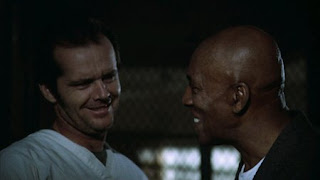"Our solemn worry was giving way, in spite of us, to joy and humor. When the nurse found the pile of pills . . . we started to pop and snort to keep from laughing, and by the time they found Mr. Turkle in the linen room and led him out blinking and groaning, tangled in a hundred yards of torn sheet like a mummy with a hangover, we were roaring. The Big Nurse took our good humor without so much as a trace of her little pasted smile; every laugh was being forced right down her throat till it looked as if any minute she'd blow up like a bladder (Kesey 297)."
This passage as it appears in the novel seems to signal a definite end of the lead of the Head Nurse, crafted in a very vivid way by author Ken Kesey. In the events preceding this passage, the patients, with the help of staff member Mr. Turkle, sneak in a couple of prostitutes carrying alcohol. McMurphy and the rest of the Acutes throw a party in the middle of the night, mixing the alcohol with some cough syrup in the medicine room and smoking marijuana with Mr. Turkle. What happens in this passage is the equivalent to the morning after, which symbolizes more than just that through the author's technique.
Kesey crafts this passage with hopes of signaling the patients' lack of concern toward the Big Nurse or the repercussions they might face after everything settles. Through Kesey's diction, one could see that he meant to inspire a more upbeat, relaxed tone in speaking about the Head Nurse than expressed previously throughout the book. Kesey uses words like "joy", "humor", "roaring" in describing the Acutes' attitude about the situation, which clearly reveals they lack any concern toward the severity of their situation.
To add to the more humorous tone of this passage, Kesey uses vivid literary devices to set the tone. Kesey uses the similes in the passage to make the situation sound even more vivid and humorous. In calling Mr. Turkle a "mummy with a hangover" and saying the Nurse would "blow up like a bladder", the author intends to make us feel just as casual and bubbly as the Acutes do in this situation.
This passage acts in a solid transition from fear to complete nonchalance toward the Big Nurse and her policies, as well as signaling the end of her fear-invoking rule over the ward. Through Kesey's positive diction and humorous use of literary devices, the audience is left feeling just as unconcerned and relieved as the Acutes on the ward do.

Kesey wrote this beautifully so that it was obvious that Nurse Ratchet's reign of terror was quickly coming to an end . . . or at least in a general sense. I like to believe that even though powers, like Nurse Ratchet, have a strong grip on people, they can be easily shook up. Though they are shook up, the stronghold is loosened only a little bit. We can see this when Billy commits suicide. Nurse Ratchet's rules may have little relevance at this point, but the emotional manipulation is the rule that cannot be forgotten.
ReplyDeleteOf course. It's always the emotional factor that lasts. That person's legacy, if you will. When all is said and done, it's not the events that occurred that matter but the emotional impact left by these events. I totally agree.
ReplyDelete